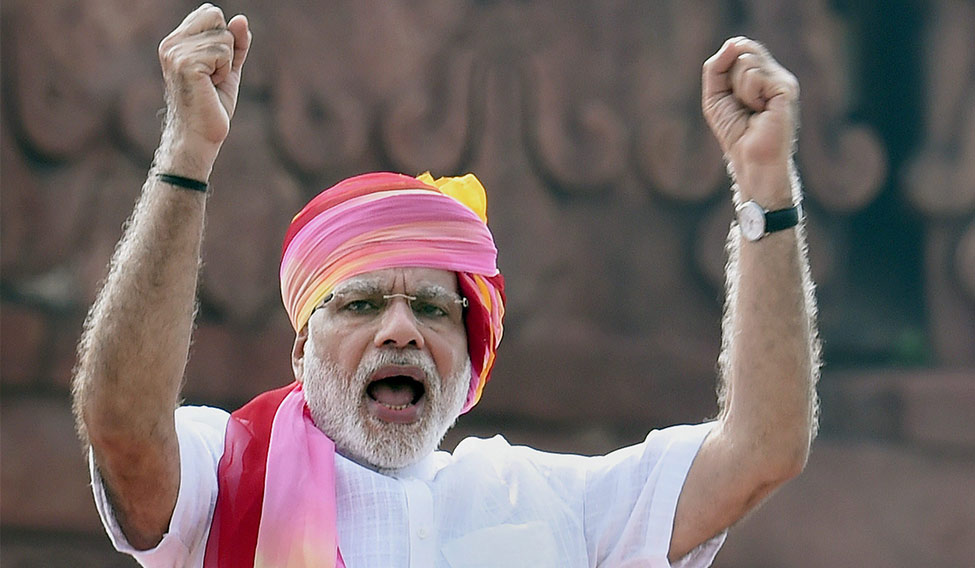At the BJP’s national council meeting in Kozhikode on September 24, Prime Minister Narendra Modi asked Pakistan to declare war on poverty and illiteracy. This was, however, not the response the audience had wanted to hear in the wake of the terrorist attack on the Army camp in Uri, on September 18.
Social media was soon awash with Modi’s old speeches, in which he had advocated strong response to Pakistan-sponsored terrorist attacks on India. Opposition parties started needling him, denting the BJP’s chances in the five states going to the polls early next year, particularly Uttar Pradesh, Punjab and Uttarakhand. But the picture changed on September 29, as India announced that it had inflicted severe damage to terrorist launch pads across the border.
“Modi answered his critics at home and abroad,” said a BJP functionary in Delhi. “Those who questioned his ‘56-inch chest’ were answered with the strikes. Even those who questioned his regular foreign trips were silenced. As Modi had struck a personal rapport with the foreign leaders, they supported India’s right to defend itself. It was a diplomatic victory, too.”
Muscular nationalism became the flavour of the festive season. And, after the success across the border, the BJP is planning campaigns at the local level to spread the message. For instance, Modi, on the invitation of the party unit in UP, will visit Lucknow to celebrate Vijayadashmi on October 11. Banners are being put up in several states to hard sell Modi’s strong image. On Vijayadashmi, Rashtriya Swayamsevak Sangh chief Mohan Bhagwat, too, is likely to laud the government’s response in his annual address.
Party sources said the lines between nationalism and hindutva had blurred as both focused on a strong country. This helps the BJP paper over differences of castes and communities, which are major factors during polls in states such as UP.
Uttar Pradesh BJP president Keshav Prasad Maurya told THE WEEK: “The strikes have been well received. People are ecstatic, so are the BJP cadres. It is a message that Pakistan may hide terrorists anywhere, but the Indian Army will hunt them down. People are with the BJP and we will now win more than 300 seats.”
A veteran party strategist, explaining the electoral arithmetic in Uttar Pradesh, said: “Everyone is fighting for the upper caste votes in the state, be it the BJP, the Samajwadi Party, the Bahujan Samaj Party or the Congress. The SP has Yadavs and Muslims on its side, the BSP has dalits and is wooing Muslims, and the Congress is aiming for the Brahmins and other upper castes. The issue of nationalism finds resonance among the upper castes and the middle class across all communities. The BJP will be the natural beneficiary of keeping the discourse around nationalism.” Said another BJP number cruncher: “Nationalism can sway nearly 10 per cent of the votes.”
In Uttarakhand, the BJP plans to counter the Congress government, which has been using soft hindutva to woo the predominantly Hindu populace. Many families in the state have members serving in the armed forces. Uttarakhand BJP president Ajay Bhatt told THE WEEK: “People now know that they can feel secure during Modi’s regime, like they did in Atal Bihari Vajpayee government. Our party would have a 15-day-long Sena Samman Samaroh (Army felicitation function). We will go to villages to talk about Modi’s steps to restore the honour of the Army.”
Bhatt, however, said the programme was not linked to the elections due in March next year. “Ram had sent his emissary Hanuman to Ravan many times to resolve the matter, but he did not listen,” he said. “Eventually, Hanuman carried out the first surgical strike in history.”
In Punjab, villages across the International Border were evacuated fearing reaction from Pakistan. The BJP here hopes to fight anti-incumbency against its ruling partner Akali Dal by marketing Modi’s strong image.
After the strike, while BJP workers celebrated with crackers and sweets, the government reached out to the opposition. Modi briefed President Pranab Mukherjee, Vice President Hamid Ansari and former prime minister Manmohan Singh before a cabinet committee on security meeting.
External Affairs Minister Sushma Swaraj met Congress president Sonia Gandhi at her residence and told her about the military action. Gandhi, who was recuperating from illness, supported the government action and hailed the armed forces. Home Minister Rajnath Singh called up various chief ministers, including Punjab’s Parkash Singh Badal and Jammu and Kashmir’s Mehbooba Mufti, both of whom he asked to prepare for evacuation along the border.
Congress spokesperson Randeep Surjewala, while lauding the armed forces, said the Army had launched surgical strikes in the past, too. “In its maturity, wisdom and in the interest of national security, the Congress government avoided making loud claims for effective response and action of the Indian Army, which had full support of the political leadership,” he said.
Among all the celebration, however, a section of the BJP seems a bit cautious. Said a senior BJP leader: “Elections in these states are still months away. A lot can happen in these months. Any retaliatory strike by Pakistan or terrorist action can reverse the sentiment or put more pressure on the government for further action. Elections are won because of candidate selection. Despite the Kargil victory in 1999, the BJP’s tally under Vajpayee did not change even though elections took place a few months later. It could only win 182 Lok Sabha seats, which was what it had won in the previous election.”





